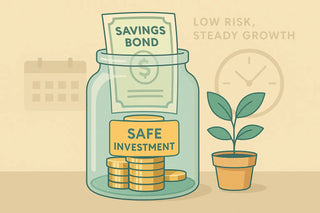When it comes to building wealth, most people think of stocks, real estate, or mutual funds. But sometimes, slow and steady really does win the race — especially if your goals are more about safety and predictability than high returns.
So, let’s answer the key question:
In which situation would a savings bond be the best investment to earn interest?
In this guide, you’ll learn exactly what savings bonds are, when they make the most sense, and how they fit into a smart, balanced financial plan.
What Is a Savings Bond?
A savings bond is a government-backed investment product that earns interest over time. In the U.S., the two main types are:
-
Series EE Bonds – Earn a fixed interest rate and are guaranteed to double in value after 20 years (if held to maturity).
-
Series I Bonds – Offer a combination of a fixed rate and a variable rate tied to inflation.
They’re considered one of the safest investments available because they’re backed by the U.S. Treasury.
In Which Situation Would a Savings Bond Be the Best Investment to Earn Interest?
Here are three ideal scenarios where savings bonds really shine:
🛡️ 1. When You Need a Safe, Long-Term Investment
If your top priorities are preserving capital and earning steady interest without market risk, savings bonds are a solid choice.
Best for:
-
First-time investors looking for low-risk options
-
Parents or grandparents investing for a child’s future
-
Conservative savers nearing retirement who want guaranteed growth
Because bonds can’t lose value (if held to maturity), they protect against the ups and downs of the stock market — offering peace of mind and guaranteed returns.
📈 2. When Inflation Is High and You Want to Protect Your Cash
Series I Bonds are designed to keep up with inflation. When consumer prices rise, so does your bond’s interest rate.
Best for:
-
Investors worried about losing purchasing power
-
Savers looking for inflation-protected returns
-
Anyone parking cash that might otherwise sit in a low-yield savings account
If inflation is eating away at your money in a bank account, an I Bond can preserve and grow your cash safely.
🎓 3. When Saving for a Predictable Future Expense
Savings bonds are ideal for saving over 5–20 years for a specific future goal, such as:
-
College tuition
-
Wedding funds
-
A down payment
-
A child’s first car or milestone gift
Even better: Series EE and I Bonds used for qualified education expenses may be tax-free — if you meet certain income limits and hold them long enough.
This makes them a great addition to a family’s legacy-building plan, especially for those looking to avoid some of the mistakes others make. For example, check out The Biggest Mistake Parents Make Setting Up a Trust Fund for more ideas on planning smarter.
When Savings Bonds Aren’t the Best Choice
While savings bonds are dependable, they’re not ideal for every situation. Avoid using them if:
-
You need quick liquidity — bonds must be held at least 12 months, and cashing them early (within 5 years) incurs a penalty
-
You're seeking high growth or aggressive returns — bonds grow slowly compared to stocks or real estate
-
You're already maximizing higher-yield opportunities like 401(k)s, Roth IRAs, or high-yield savings accounts
Want to explore more wealth-building tools? Learn Why Investing Is a More Powerful Tool to Build Long-Term Wealth Than Saving
How Much Can You Invest in Savings Bonds?
Each year, individuals can invest:
-
Up to $10,000 in I Bonds (electronic)
-
Up to $5,000 in paper I Bonds (using your federal tax refund)
-
Up to $10,000 in EE Bonds
You can buy them online via TreasuryDirect.gov — the official U.S. government site for savings bonds and other securities.
How Savings Bonds Fit Into a Balanced Financial Plan
Savings bonds work best when paired with other smart habits and tools:
-
Use them as part of your emergency fund or college savings plan
-
Combine them with higher-return investments for long-term growth
-
Budget wisely and allocate part of your income to bonds each year
Need help getting your day-to-day finances in order while planning for your future? Check out:
📋 What Can Help You Meet Your Budget When Shopping
And when you do land that next great job? Make sure you know how to respond the right way:
📩 How to Accept a Job Offer the Right Way
Final Takeaway: Are Savings Bonds Right for You?
So… in which situation would a savings bond be the best investment to earn interest?
✅ When you want safety
✅ When you’re planning for the long-term
✅ When you want a steady, low-risk return
✅ When inflation is high and you want your money to keep its value
They’re not flashy. But they are reliable. And in today’s economy, that can be the smartest move you make.
